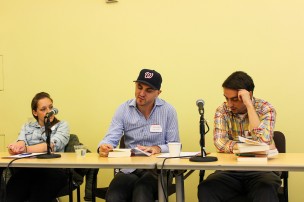University students, Posse veterans, and civilians came together for “Storytelling for Life, Business and Politics: A Writing Symposium at Wesleyan”.
This past Saturday, University students, Posse veterans, and civilians came together for “Storytelling for Life, Business and Politics: A Writing Symposium at Wesleyan.” The event was jointly hosted by Wesleyan and Words After War, which is a nonprofit organization that uses writing to bridge the veteran-civilian divide and to spark conversation.
This day-long symposium, the first of its kind, featured veterans from the U.S. Army, Marines, and infantry officers who have served in Iraq, Afghanistan, Egypt, Yugoslavia, and Kosovo, alongside both teachers and others from the writing industry who have focused their careers on writing about war and conflict.
The event opened with an introduction from the Vice President for Equity and Inclusion Antonio Farias, who talked about making an event as specific as this one applicable to all types of people.
“How do you get enough people to come here, and have this conversation with veterans and civilians?” he said. “You center it around craft.”
Brandon Willitts, Executive Director and Co-Founder of Words After War, spoke about his dual experience as a military veteran and a liberal arts grad. Through his foundation, he aims to create spaces where people can discuss war literature and share their experiences.
“I never felt as alone as when I had no one to understand my experience,” he said about returning from war and reentering society. These discussions are important, he said, because “war is the human experience, the human story.”
The symposium was structured into panels focusing on writing as a craft with an eye to war literature. They included “The Art of the Interview,” “Writing Your War (Memoir, Creative Non-Fiction)” and “Journalism, Politics and National Security.”
Throughout the day, others also weighed in on the value of war literature. During the “Elements of Craft” panel, various authors discussed the value of war literature. Matt Gallagher, a former U.S. Army Captain and author of the Iraq memoir, “Kaboom,” said that writing was both a way of communication and a way to understand other points of view.
For him, writing war literature is not about expression, but rather about communication.
“[Genre matters because] it gets to the nature of who we are as an American people in 2015,” he said.
Maxwell Neely-Cohen, author of “Echo of the Boom,” is involved with the organization and the event because he is interested in how people come together. He previously studied war and conflict.
“[Art] definitely affects how people perceive things, and that has real social and political influence,” Neely-Cohen said. “I was always really fascinated with the idea that literature and storytelling can bridge real divides. And that really drew me to it.”
Other sessions combined practical knowledge about journalism and the writing industry with specific advice about how to hone each person’s specific craft.
Kristin L. Rouse, who served for more than 21 years in the U.S. Army, National Guard and Army Reserve, and holds a Master’s Degree in English from Loyola University, gave advice about writing about conflict. She gave specific advice to veterans about being interviewed about their wartime experiences.
“When the world hands you a microphone, what is it you have to say?” she said. “Whatever you tell a journalist will be put on blast—that’s your truth that you have to share.”
Bryan Stascavage ’18, a Posse veteran, worked as a liaison for the University’s Posse veterans in helping to shape the event, giving more practical advice and bringing writers and thinkers who focus on the post-9/11 era.
This event ultimately created a community of writers, civilians and veterans alike, who came together to come together to hone their craft.
“I think we made it accessible,” Willitts said. “We put it at Wesleyan, we made it far more academic, far more accessible, far more literary, and we reduce barriers and democratize what we’re trying to accomplish. If we have civilians who are otherwise not connected to the military or to war who show up at our events out of pure curiosity and the desire to be a part of whatever it is we’re building, this community, to me that’s the metric that I use.”
Ultimately, the appeal of the event was widespread because it touched on themes applicable to everyone who writes. Kati Young ’19, a prospective Science in Society major, was interested in what the conference had to offer.
“I think what I really liked about it was how they were able to frame how your message was received as opposed to what you want to say, and the importance of true communication,” she said. “I’m using the skills that I gained this Saturday in my first year seminar class, I’m going to use it when I’m writing lab reports, and when I’m communicating with others, and in the way that I think about how I receive information.”
